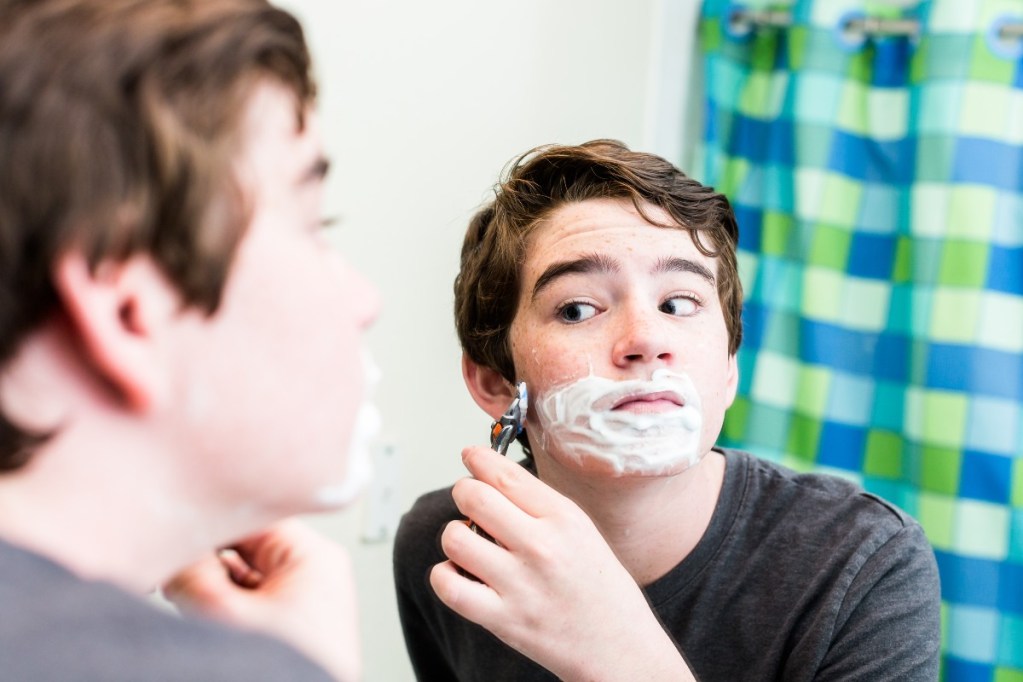Parenting teens is not for the faint of heart! Exploring sexuality is a normal part of growing up, especially as kids progress through their teenage years. Although it may be uncomfortable for parents to discuss sex behavior with their teens, being educated about typical sexual development and what teens may be hearing from their peers is important. Parents should be able to talk openly with their child about protection, consent, risk reduction, and other issues.
Teens will be talking about sex and exploring this new part of their lives eventually and it’s perfectly natural. Having your head in the sand won’t make it go away, so the information below will prepare you with information to tackle this new stage of parenting.

Puberty
The onset of puberty is what can start the beginning of this stage of life for teens, but it doesn’t mean they’re ready for sex; just that they may start experiencing sexual thoughts like crushes or urges like feeling aroused. On average, puberty begins between ages 8 and 14.
The hormonal changes with puberty bring on many physical changes. Menstruation begins, breasts develop, testicles drop, pubic hair, body hair, and facial hair grow, and voices begin to deepen. Your child may be concerned about acne, body odor, and mood swings. Emotional changes happen, too, and the infamous teen moodiness rears its ugly head.
All of this impacts the beginning of sexual behavior. The hormones causing the physical changes are also causing sexual feelings and the physical changes are causing peers to notice each other in different ways. Masturbation becomes more frequent during puberty and is completely normal. According to a 2010 study, 80% of male teenagers said they have masturbated, while 48% of female teenagers said the same. Masturbation is a safe way for a teen to explore their sexual feelings without any risk of STIs, pregnancy, or anything else associated with sex.

Dating
According to the American Academy of Pediatrics, girls start dating at age 12 and boys start dating at age 13, on average. Many pediatricians, including those from the AAP, recommend waiting until age 16 to start dating. One reason for this is that 1 in 3 American teenagers experience sexual, physical, emotional, or verbal abuse from a date, as per WebMD. Having more self-confidence and a developed sense of self before dating can help a child stand up to these moments instead of continuing in an abusive relationship, a type of relationship that is shockingly common for teens.
What does dating even mean for tweens and young teens? Often, it can mean going on group dates, where there is more than one set of teens and some non-coupled friends together. This provides some social buffer and can also provide safety. This can be encouraged in tweens and younger teens instead of one-on-one dates.

Sex
Yup, your little one is growing up and ready or not, they’ll be taking this step at some point. Remember that this is a normal part of coming into adulthood and nothing shameful, but that you can help talk to them about being ready and about issues like consent and contraception. Here is the data on when it may happen and what you need to know about how to help them be safe.
The average age teens have sex for the first time is 17 years old, and 55% of teens have had sexual intercourse by age 18. So, for many, they’ve been dating for five years before having sex for the first time. Almost half of teens may not have sex at all in teenagerhood.
Many parents worry about whether their child is emotionally ready for sex, and that will vary entirely by individual. Your teen will be the one who ends up making that choice for themselves. Whether they are ready to handle the responsibilities of the risks like pregnancy and STIs is another story, and that’s something there is actually data on.
According to data in the 2010s from the CDC, 99% of female teens who had had sex used some kind of contraception. Across all teens, about 80% used some form of contraception the first time they ever had sex.
In 2019, 1.7% of females ages 15 to 19 got pregnant, according to the CDC. The teen pregnancy rate has been steadily decreasing since 1991, but note that the number does vary by racial identity and by state. Have a plan for your sexually active teen regardless of their gender for what would happen in case of accidental pregnancy.
When it comes to STIs, the CDC reports that 15- to 24-year-olds account for half the cases in the U.S., while noting that chlamydia and gonorrhea rates are highest for girls during their teen and young adult years. So, even while contraception use may be high, it’s just preventing pregnancy and not STI transmission. It’s also important to note that 1 in 4 new HIV infections in the U.S. happen to teenagers, and most of them are males. HIV is highly treatable, but not fully curable.

How to talk to teens about sex
It can be uncomfortable and even embarrassing to talk to your teen about sex, but it is important. One thing the Center for Parent and Teen Communication stresses is that talking to your teen about sex and sexuality isn’t a one-time thing. These are conversations that should be ongoing, so there’s not so much pressure on having one “talk.”
They suggest putting your own discomfort aside while learning as much factual information as possible. That way, you can present the information to your teen in a knowledgeable way that makes them feel at ease. If you’re uncomfortable talking about teen sex behavior, your teen will probably be uncomfortable too. Talking to your child early about respect, consent and appropriate behavior will help them advocate for themselves and how to set and respect boundaries.
Thanks to the internet and social media, teens have access to a lot of varied information about sex and sexuality. Having continuous open and honest communication with your teen will allow you to give them factual information while building trust.
There’s no one-size-fits-all answer when it comes to teen sexual behavior, but this data can guide you in informing your conversations with your teen and your decisions about what to allow and what to provide. Teen sexual development is as natural as teen physical development, so be prepared for when and how it will happen.




